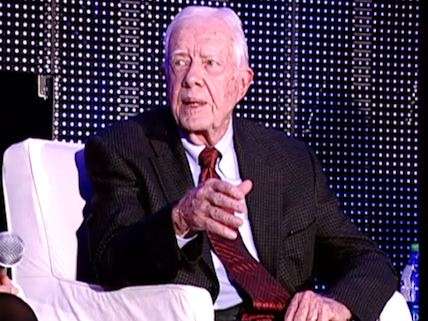What Made Jimmy Carter Flip-Flop on Marijuana? And Could the Same Tactic Work on Voters?

In the space of five months former Pres. Jimmy Carter has seemingly done a 180-degree turn on marijuana policy. During a December 2012 CNN panel, Carter endorsed Colorado and Washington's decision to liberalize their marijuana laws:
Suzanne Malveaux: What do you make of the legalization of marijuana, and the states that have legalized marijuana?
Carter: I'm in favor of it. I think it's OK. I don't think it's going to happen in Georgia yet. But I think we can watch and see what happens in the state of Washington, for instance, around Seattle. And let the American government and the American people see does it cause a serious problem, or not.
A few states in America are good to take the initiative and try something out. That's the way our country has developed over the last two hundred years, is by a few states being kind of experiment stations.
Last week, "at a meeting that included state legislators and regulators from Colorado and Washington, as well as most of the states targeted for legalization in 2016," Carter said something very different:
Mr. Carter announced that he "opposed the legalization of marijuana" and predicted experiments with marijuana legalization in Washington and Colorado would go badly.
"I do not favor legalization. We must do everything we can to discourage marijuana use, as we do now with tobacco and excessive drinking. We have to prevent making marijuana smoking from becoming attractive to young people, which is, I'm sure, what the producers of marijuana … are going to try and do."
In a press release last issued last week, Project SAM (the anti-marijuana group launched by former Office of National Drug Control Policy staffer Kevin Sabet and former Rep. Patrick Kennedy) claimed that Carter has been "falsely characterized as supporting legalization by pro-marijuana lobbyists nationwide," and thus his conversion wasn't a conversion at all. That claim doesn't exactly square with Carter telling CNN's Malveaux (on video, I might add) that he's "in favor of" and "OK" with Colorado and Washington legalizing marijuana, but it is consistent with Carter's description of his motivation, back when he was president, for decriminalizing cannabis at the federal level. "I always said nobody should be punished worse for smoking a [marijuana] cigarette than the cigarette would be for them if they smoked it."
Carter joining the ranks of Sabet and Kennedy (and by extension, folks like Mel Sembler, who is the biggest individual funder of the anti-marijuana movement) is thus not only unsurprising, but also a modest testament to the power of Project SAM's "third way" message, which appeals to technocrats, conservatives, and public health advocates, despite its ocassional inconsistency.
While a recent Reason-Rupe poll found that a plurality (35 percent) of Americans think there should be absolutely no punishment for marijuana use, another 20 percent believed that marijuana use should be punished with mandatory substance abuse counseling. What I'm wondering is if Project SAM can grow that 20 percent between now and 2016. They landed Jimmy Carter, after all.
